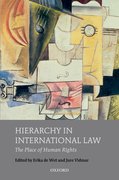Catherine MAIA
This book takes an inductive approach to the question of whether there is a hierarchy in international law, with human rights obligations trumping other duties. It assesses the extent to which such a hierarchy can be said to exist through an analysis of the case law of national courts. Each chapter of the book examines domestic case law on an issue where human rights obligations conflict with another international law requirement, to see whether national courts gave precedence to human rights. If this is shown to be the case, it would lend support to the argument that the international legal order is moving toward a vertical legal system, with human rights at its apex.
TABLES OF CONTENTS
1: Erika de Wet, Jure Vidmar: Introduction
2: Jure Vidmar: Norm Conflicts and Hierarchy in International Law: Towards a Vertical International Legal System?
3: Antonios Tzanakopoulos: Human Rights and United Nations Security Council Measures
4: Riccardo Pavoni: Human Rights and the Immunities of Foreign States and International Organizations
5: Philippa Webb: Human Rights and the Immunities of State Officials
6: Harmen van der Wilt: On the Hierarchy between Extradition and Human Rights
7: Geoff Gilbert: Human Rights, Refugees and Other Displaced Persons in International Law
8: Dinah Shelton: Resolving Conflicts between Human Rights and Environmental Protection: Is there a Hierarchy?
9: Susan Karamanian: Human Rights Dimensions of Investment Law
10: Andreas Ziegle, Bertram Boie: The Relationship between International Trade Law and International Human Rights Law
11: Erika de Wet, Jure Vidmar: Conclusions

Erika De Wet and Jure Vidmar (eds.), Hierarchy in International Law. The Place of Human Rights, Oxford, Oxford University Press, 2012 (368 pp.)
Edited by Erika De Wet, Co-Director and Professor of International Law, Institute for International and Comparative Law in Africa, University of Pretoria; Professor of International Constitutional Law, University of Amsterdam, and Jure Vidmar, Anglo-German Fellow, Institute of European and Comparative Law, Faculty of Law, University of Oxford.
Erika de Wet is Co-Director of the Institute for International and Comparative Law in Africa and Professor of International Law at the University of Pretoria. Between 2004 and 2010, she was a full-time (tenured) Professor of Constitutional Law at the Amsterdam Center for International Law, University of Amsterdam, a position which she still holds part-time. She further lectures in international law at the University of Zurich and the University of Bonn on a regular basis. Between 2007 and 2010 she served as a member of the Advisory Committee on Issues of Public International Law of the Netherlands (CAVV).
Jure Vidmar is an Anglo-German Fellow in the Institute of European and Comparative Law, Faculty of Law, University of Oxford. Previously, Jure worked as a post-doctoral researcher at the Amsterdam Center for International Law, Faculty of Law, University of Amsterdam. He is a member of the editorial board of the Hague Yearbook of International Law. Jure's main research and teaching interests lie within public international law, human rights, European law, and political theory. In recent years, Jure's publications have mainly covered topics such as the creation, recognition and delimitation of states; human rights and democracy; the right of self-determination; the right to political participation and democratisation theory. Jure holds a doctorate in politics from the University of Salzburg as well as an LLM and PhD in law from the University of Nottingham.
Contributors:
Bertram Boie - World Trade Institute
Geoff Gilbert - University of Essex
Susan Karamanian - George Washington University
Riccardo Pavoni - University of Siena
Dinah Shelton - George Washington University
Antonios Tzanakopoulos - University of Glasgow
Philippa Webb - Legal consultant
Harmen van der Wilt - University of Amsterdam
Andreas Ziegler - University of Lausanne
Aucun commentaire :
Enregistrer un commentaire